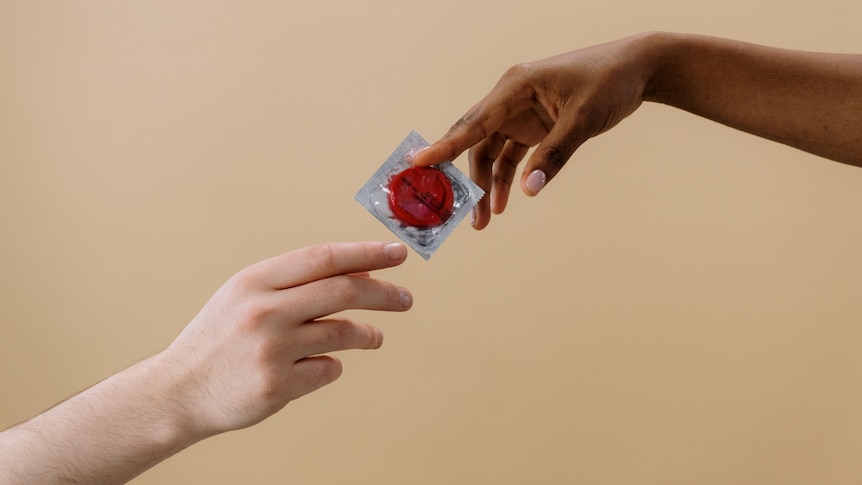NOT 100% SAFE MEN ARE SNOWFLAKES
Just days after Melbourne urologist Nathan Lawrentschuk opened up applications for a world-first clinical trial of a new form of male birth control, he had to close them again. "Every time we open the portal, it just gets bombarded," he says.
The draw card isn't money, study participants aren't allowed to be paid. While some could be driven by the scientific cause or an odd desire to provide regular semen samples, Lawrentschuk believes it is something more straightforward: "It speaks to the fact that there is a huge gap in the market."
In a world where birth control has long been the purview of women, the proposition certainly sounds revolutionary. A hydrogel that hardens after being inserted into the vas deferens, the same tube that is cut or closed in a vasectomy, blocking the sperm from exiting. Lawrentschuk calls it a "no scalpel vasectomy", but it also differs in another crucial way — the gel is designed to dissolve on its own after about two years.
"There's never really been anything like it in the market," says Lawrentschuk, who is the principal investigator on the ADAM study. "A lot of men would like to be in the driver's seat when it comes to knowing they've got full control over their contraception, and there's really been no product to date, other than having a permanent vasectomy, that's allowed them to do that."

Professor Nathan Lawrentschuk during the first insertion of the hydrogel that researchers say acts as a "no scalpel vasectomy".(Supplied: Epworth HealthCare)
The study, conducted by Epworth HealthCare, is currently in its second of three years. If successful, it will mark a major turning point in a decades-long saga marred by a slew of promising starts and just as many disappointing stops.
Since the female contraceptive pill was introduced more than 60 years ago, scientists have sought a similar solution for men. But as new contraceptive technologies have flowed onto the market for women, options for men have remained elusive. Today there are just two options: condoms, with a real-world failure rate of around 13 per cent, and permanent vasectomies (reversals exist but are expensive, costing up to $7,000, and are not guaranteed to work).
This is despite headlines regularly declaring imminent breakthroughs. In recent years these include the trial of a non-hormonal male pill known as YCT-529, a compound that blocks an enzyme sperm need to swim that has shown great promise in mice, and a topical gel that when rubbed on men's shoulders once per day temporarily lowers their sperm count.
"It's been 'five years away' since 1975," says Professor Robert McLachlan, an endocrinologist and leader in male hormonal contraceptive research. "If you're asking me when it's going to be at the local chemist? Well a very, very, very long time, if at all."
The reason for this delay, according to some experts, is not unresolved science — but money.
A disappointing history
"I've given basically the same interview in 1993, 2003, 2013, and 2023, and unfortunately nothing much has changed in the past 30 years," McLachlan says. "Except we do know, spoiler alert, that it works perfectly well."
Male birth control research is largely split into two camps: hormonal solutions, that stop or slow sperm production and in many cases mirror the well-established female oral contraceptive pill, and non-hormonal technologies that may impact sperm production, its movement out of the body (sperm transport) or its ability to swim (sperm motility).

Professor Robert McLachlan is hopeful that a hormonal male birth control could eventually make it to market. (Supplied: Robert McLachlan)
McLachlan began work on the former in the 1980s, decades after a "male pill" was first proposed. In his view, the science is settled — it works at preventing pregnancy, at least as well as its female equivalents. What went wrong is everything else.
By the 1990s, research into the use of testosterone to reduce sperm numbers was underway. With weekly injections, the majority of men's sperm counts dropped to "almost zero" and pregnancy rates were on par with what you would expect from existing contraceptives, McLachlan says. In other words, it worked, but the trade-off was side effects including acne, weight gain, and mood swings — symptoms that might sound familiar to many women on the pill.
Researchers then tried lowering the testosterone dose and adding progesterone and "lo and behold, 95 per cent of those men got sperm counts of zero or less than a million, which was so low as to give a reasonable level of contraceptive cover," McLachlan says.
The crescendo came in 2011 when the World Health Organization sponsored an international study into the use of this hormone combination as birth control. More than 300 men in monogamous relationships from around the world began receiving an injection containing the two hormones every 10 weeks.
But some participants reported mood changes, depression, and pain at the injection site. The WHO pulled the plug, concluding that the "risks outweighed the potential benefits".
"The whole thing crashed like a house of cards," says McLachlan, who co-authored the report on the study. "Not because it doesn't work, because the social, geopolitical, pharmaceutical, environmental, litigious environment in which we currently live meant everybody pulled out."
Research into a male birth control pill has been going on since the female contraceptive pill was released in the 1960s, but so far no trials have been successful. (Unsplash: Melany Tuinfosalud)
By the end of the prematurely aborted trial, 75 per cent of participants said they were satisfied with the method and willing to use it again if it became available. McLachlan says there's no way to know whether the mental health issues were related to the hormones, given how common depression is. This is one of the challenges inherent to trialling contraceptives: you can't have a control group as placebos don't prevent pregnancy.
"I remember the pharmaceutical people saying at the time, 'Listen, guys, we love you all and we get this, but here is the reality: it's very, very expensive to continue with it now, there are concerns about whether the side effects are true or not, the marketability, the drugs are probably not patentable … how would there be a recoupment of investment?'," McLachlan says.
"It basically killed the field."
The funding gap
"I wasn't a six-year-old saying I want to work in male contraception when I grow up," Heather Vahat laughs over the phone from Durham, North Carolina, where she heads up the Male Contraceptive Initiative.
Instead, her career began at a not-for-profit working with female contraceptive development, during which time she travelled throughout India and Kenya to ask women what they wanted from their birth control. "And the women kept saying, 'What about developing methods for men? That would be a great method for women."
The Male Contraceptive Initiative (MCI) was created to push for greater male contraceptive choice and now provides funding for international research into non-hormonal options. The not-for-profit has so far given more than $12 million in research grants for the development of non-hormonal, reversible male contraceptives, making them one of the largest funders of male birth control research.
Australia's complicated relationship with the pill
The culmination of birth control content on social media gives the distinct impression that young women today are well and truly fed up with the pill. In Australia, however, the research suggests a different reality.

Posted 21 Jan 2024
By Maani Truu
Posted Sun 21 Jan 2024

Posted Sun 21 Jan 2024
Why in the year 2024 are the only two contraceptive options for men condoms or vasectomies?
(Pexels: cottonbro studio)
Just days after Melbourne urologist Nathan Lawrentschuk opened up applications for a world-first clinical trial of a new form of male birth control, he had to close them again. "Every time we open the portal, it just gets bombarded," he says.
The draw card isn't money, study participants aren't allowed to be paid. While some could be driven by the scientific cause or an odd desire to provide regular semen samples, Lawrentschuk believes it is something more straightforward: "It speaks to the fact that there is a huge gap in the market."
In a world where birth control has long been the purview of women, the proposition certainly sounds revolutionary. A hydrogel that hardens after being inserted into the vas deferens, the same tube that is cut or closed in a vasectomy, blocking the sperm from exiting. Lawrentschuk calls it a "no scalpel vasectomy", but it also differs in another crucial way — the gel is designed to dissolve on its own after about two years.
"There's never really been anything like it in the market," says Lawrentschuk, who is the principal investigator on the ADAM study. "A lot of men would like to be in the driver's seat when it comes to knowing they've got full control over their contraception, and there's really been no product to date, other than having a permanent vasectomy, that's allowed them to do that."
Professor Nathan Lawrentschuk during the first insertion of the hydrogel that researchers say acts as a "no scalpel vasectomy".(Supplied: Epworth HealthCare)
The study, conducted by Epworth HealthCare, is currently in its second of three years. If successful, it will mark a major turning point in a decades-long saga marred by a slew of promising starts and just as many disappointing stops.
Since the female contraceptive pill was introduced more than 60 years ago, scientists have sought a similar solution for men. But as new contraceptive technologies have flowed onto the market for women, options for men have remained elusive. Today there are just two options: condoms, with a real-world failure rate of around 13 per cent, and permanent vasectomies (reversals exist but are expensive, costing up to $7,000, and are not guaranteed to work).
This is despite headlines regularly declaring imminent breakthroughs. In recent years these include the trial of a non-hormonal male pill known as YCT-529, a compound that blocks an enzyme sperm need to swim that has shown great promise in mice, and a topical gel that when rubbed on men's shoulders once per day temporarily lowers their sperm count.
"It's been 'five years away' since 1975," says Professor Robert McLachlan, an endocrinologist and leader in male hormonal contraceptive research. "If you're asking me when it's going to be at the local chemist? Well a very, very, very long time, if at all."
The reason for this delay, according to some experts, is not unresolved science — but money.
A disappointing history
"I've given basically the same interview in 1993, 2003, 2013, and 2023, and unfortunately nothing much has changed in the past 30 years," McLachlan says. "Except we do know, spoiler alert, that it works perfectly well."
Male birth control research is largely split into two camps: hormonal solutions, that stop or slow sperm production and in many cases mirror the well-established female oral contraceptive pill, and non-hormonal technologies that may impact sperm production, its movement out of the body (sperm transport) or its ability to swim (sperm motility).
Professor Robert McLachlan is hopeful that a hormonal male birth control could eventually make it to market. (Supplied: Robert McLachlan)
McLachlan began work on the former in the 1980s, decades after a "male pill" was first proposed. In his view, the science is settled — it works at preventing pregnancy, at least as well as its female equivalents. What went wrong is everything else.
By the 1990s, research into the use of testosterone to reduce sperm numbers was underway. With weekly injections, the majority of men's sperm counts dropped to "almost zero" and pregnancy rates were on par with what you would expect from existing contraceptives, McLachlan says. In other words, it worked, but the trade-off was side effects including acne, weight gain, and mood swings — symptoms that might sound familiar to many women on the pill.
Researchers then tried lowering the testosterone dose and adding progesterone and "lo and behold, 95 per cent of those men got sperm counts of zero or less than a million, which was so low as to give a reasonable level of contraceptive cover," McLachlan says.
The crescendo came in 2011 when the World Health Organization sponsored an international study into the use of this hormone combination as birth control. More than 300 men in monogamous relationships from around the world began receiving an injection containing the two hormones every 10 weeks.
But some participants reported mood changes, depression, and pain at the injection site. The WHO pulled the plug, concluding that the "risks outweighed the potential benefits".
"The whole thing crashed like a house of cards," says McLachlan, who co-authored the report on the study. "Not because it doesn't work, because the social, geopolitical, pharmaceutical, environmental, litigious environment in which we currently live meant everybody pulled out."
Research into a male birth control pill has been going on since the female contraceptive pill was released in the 1960s, but so far no trials have been successful. (Unsplash: Melany Tuinfosalud)
By the end of the prematurely aborted trial, 75 per cent of participants said they were satisfied with the method and willing to use it again if it became available. McLachlan says there's no way to know whether the mental health issues were related to the hormones, given how common depression is. This is one of the challenges inherent to trialling contraceptives: you can't have a control group as placebos don't prevent pregnancy.
"I remember the pharmaceutical people saying at the time, 'Listen, guys, we love you all and we get this, but here is the reality: it's very, very expensive to continue with it now, there are concerns about whether the side effects are true or not, the marketability, the drugs are probably not patentable … how would there be a recoupment of investment?'," McLachlan says.
"It basically killed the field."
The funding gap
"I wasn't a six-year-old saying I want to work in male contraception when I grow up," Heather Vahat laughs over the phone from Durham, North Carolina, where she heads up the Male Contraceptive Initiative.
Instead, her career began at a not-for-profit working with female contraceptive development, during which time she travelled throughout India and Kenya to ask women what they wanted from their birth control. "And the women kept saying, 'What about developing methods for men? That would be a great method for women."
The Male Contraceptive Initiative (MCI) was created to push for greater male contraceptive choice and now provides funding for international research into non-hormonal options. The not-for-profit has so far given more than $12 million in research grants for the development of non-hormonal, reversible male contraceptives, making them one of the largest funders of male birth control research.
Australia's complicated relationship with the pill
The culmination of birth control content on social media gives the distinct impression that young women today are well and truly fed up with the pill. In Australia, however, the research suggests a different reality.
Read more
According to Vahat, this in itself is a big problem. "There's not a lot of money in the space," she says. "We grant one and a half million dollars a year, and that's a rounding error in a pharmaceutical development budget."
For decades, pharmaceutical companies have largely steered clear of contraceptive development. A report published in 2022 described the pharmaceutical industry's current involvement in the space as "minimal". "Why the loss of engagement? It is possible that the novelty of male birth control is seen as too risky for profits, and the market underappreciated," it reads.
Vahat has her own theories about what might be going on. The first is simple: there are already a handful of effective options on the market, albeit only for half the population. "If you're not considering the side effect issues that women deal with, what's out there is good enough, there's choice," she says.
The second is due to the nature of the product. Unlike other pharmaceuticals created to treat people who are sick, and therefore likely more willing to endure necessary side effects, contraception is used by healthy people, meaning there's a low tolerance for adverse effects.
And third, she says, contraception is tied to foreign aid, which has meant philanthropic organisations and governments have traditionally stepped in during the expensive and risky development phase. (The hormonal IUD, Mirena, for example, was first developed by the Population Council, an international not-for-profit, before being distributed by pharmaceutical companies.) "If you are looking purely at numbers, it's always that game of where to invest your money," she says.
But something less tangible is going on, too. "There's the business case and then there is this myth — mythology is what we call it — that men aren't interested and women won't trust them, that has been going on for ages."
The reality is men have never had the chance to take the lead on long-lasting birth control, which has become so inextricably linked with women's bodies. "There's this one statement that just sticks with me, and it's that we've stopped thinking of men as reproductive beings," Vahat says.
There's also some evidence to suggest that the mythology that men won't take birth control is just that, a myth.
An online survey of men of reproductive age in Canada and the US published this year found three-quarters of respondents would be willing to use contraception. Decades earlier, in 2000, another survey across three countries found 44–83 per cent of men would definitely or probably use a hormonal birth control pill. And as it stands now, many men are already primarily responsible for handling birth control, through condoms or the withdrawal method.
As for women's trust in their partners, experts believe that is countered by the fact many of the proposed options are long-lasting and well-documented. If your partner only needs to have a procedure every two years, for example, they say it's relatively easy to ensure that has happened.
"In stable couples, there's no reason to believe men wouldn't be as committed as their partners because they don't want an unwanted pregnancy," McLachlan says. "It's a joint decision, so it's rather insulting to those men to say they wouldn't have been trusted."
What's at stake?
All of this discussion is taking place against a rising tide of disquiet — where once the pill signified women's liberation, turn to social media today and you'll see that many women see it as more of a burden. TikTok, Facebook groups, and YouTube are awash with hormonal horror stories — from depression to acne, and mood swings, the list goes on — and a growing chorus of calls for men to shoulder more of the responsibility.
In lieu of a long-lasting, reversible male contraception, there are signs that some men are taking matters into their own hands. In the 2013-14 financial year 22,200 Australian men had vasectomies under Medicare — by 2022-23, that number grew to 38,800, according to federal government data.
One of the doctors performing them is Dr Justin Low, the national director of vasectomy services at MSI Australia, the reproductive health service formerly known as Marie Stopes International. "It's a bizarre situation where you've got the most unreliable form but easily accessible contraception on one hand, and the most life-changing on the other, and nothing in between," he says. "So it's a big dilemma for guys who are trying to take control of their own fertility."
It's time to normalise vasectomies
It's fast, largely pain-free and takes a huge contraceptive responsibility off women — it's no wonder more and more men are choosing to get the snip.

According to Vahat, this in itself is a big problem. "There's not a lot of money in the space," she says. "We grant one and a half million dollars a year, and that's a rounding error in a pharmaceutical development budget."
For decades, pharmaceutical companies have largely steered clear of contraceptive development. A report published in 2022 described the pharmaceutical industry's current involvement in the space as "minimal". "Why the loss of engagement? It is possible that the novelty of male birth control is seen as too risky for profits, and the market underappreciated," it reads.
Vahat has her own theories about what might be going on. The first is simple: there are already a handful of effective options on the market, albeit only for half the population. "If you're not considering the side effect issues that women deal with, what's out there is good enough, there's choice," she says.
The second is due to the nature of the product. Unlike other pharmaceuticals created to treat people who are sick, and therefore likely more willing to endure necessary side effects, contraception is used by healthy people, meaning there's a low tolerance for adverse effects.
And third, she says, contraception is tied to foreign aid, which has meant philanthropic organisations and governments have traditionally stepped in during the expensive and risky development phase. (The hormonal IUD, Mirena, for example, was first developed by the Population Council, an international not-for-profit, before being distributed by pharmaceutical companies.) "If you are looking purely at numbers, it's always that game of where to invest your money," she says.
But something less tangible is going on, too. "There's the business case and then there is this myth — mythology is what we call it — that men aren't interested and women won't trust them, that has been going on for ages."
The reality is men have never had the chance to take the lead on long-lasting birth control, which has become so inextricably linked with women's bodies. "There's this one statement that just sticks with me, and it's that we've stopped thinking of men as reproductive beings," Vahat says.
There's also some evidence to suggest that the mythology that men won't take birth control is just that, a myth.
An online survey of men of reproductive age in Canada and the US published this year found three-quarters of respondents would be willing to use contraception. Decades earlier, in 2000, another survey across three countries found 44–83 per cent of men would definitely or probably use a hormonal birth control pill. And as it stands now, many men are already primarily responsible for handling birth control, through condoms or the withdrawal method.
As for women's trust in their partners, experts believe that is countered by the fact many of the proposed options are long-lasting and well-documented. If your partner only needs to have a procedure every two years, for example, they say it's relatively easy to ensure that has happened.
"In stable couples, there's no reason to believe men wouldn't be as committed as their partners because they don't want an unwanted pregnancy," McLachlan says. "It's a joint decision, so it's rather insulting to those men to say they wouldn't have been trusted."
What's at stake?
All of this discussion is taking place against a rising tide of disquiet — where once the pill signified women's liberation, turn to social media today and you'll see that many women see it as more of a burden. TikTok, Facebook groups, and YouTube are awash with hormonal horror stories — from depression to acne, and mood swings, the list goes on — and a growing chorus of calls for men to shoulder more of the responsibility.
In lieu of a long-lasting, reversible male contraception, there are signs that some men are taking matters into their own hands. In the 2013-14 financial year 22,200 Australian men had vasectomies under Medicare — by 2022-23, that number grew to 38,800, according to federal government data.
One of the doctors performing them is Dr Justin Low, the national director of vasectomy services at MSI Australia, the reproductive health service formerly known as Marie Stopes International. "It's a bizarre situation where you've got the most unreliable form but easily accessible contraception on one hand, and the most life-changing on the other, and nothing in between," he says. "So it's a big dilemma for guys who are trying to take control of their own fertility."
It's time to normalise vasectomies
It's fast, largely pain-free and takes a huge contraceptive responsibility off women — it's no wonder more and more men are choosing to get the snip.
Read more
Vasectomies — which have traditionally involved cutting the vas deferens, but can now be performed without a scalpel by suturing the tube closed — have traditionally been recommended for men who are finished having children. Recently, however, Low says he's seeing more young people in their 20s without children seeking out the procedure.
"Young men are coming to us saying 'I want control'," he says. "Yes you can put a condom on, but it's not safe, we know it's not great."
James, who did not wish to use his last name, told ABC News that he had his application for a vasectomy knocked back twice on account of his age. The 20-year-old was "pretty set on not having kids from a very young age" and decided on having a vasectomy after learning there were no other long-lasting and reliable options available.
But he was surprised to be told he would have to wait until he was older or undergo counselling to be considered for the procedure.
"Seeing people around my age having kids by accident fuels the fire even more," James says. "The thought is always there in the back of my mind that I want this done — and I should be able to get it done."
His next step is looking into freezing his sperm, which he believes, might make it easier for him to get the procedure. In the meantime, he keeps an eye out for headlines about new male contraceptive developments. "Unfortunately, everything I've read is only just a headline," he says. "They don't go into much depth about the timeline."
That's probably because nobody really knows what a timeline could look like. After so many false starts, even the most promising new developments are met with scepticism. "It won't be in my lifetime, I'm getting too old to see it all the way through now," McLachlan says of the search for a viable hormonal solution. "But the pilot light is not out."
For now, attention seems to have shifted away from a so-called "male pill" and towards the development of non-hormonal options.
"Can you imagine introducing the [female] oral contraceptive pill in 2024? Do you think it would get over the hurdle? Or would there be a little more pushback?" Lawrentschuk says. "It's only popular now because it's been around a long time and it's actually relatively safe."
As for the ADAM study — which doesn't involve any hormones — the team is "quietly confident that the research is heading in the right direction". So far there's been no evidence of long-term issues, and any side effects have been "extremely minor in the grand scheme of things".
So if things continue in this vein, when might we see the hydrogel on the market? "Realistically, somewhere around three years," Lawrentschuk says. "It seems like a long way off, but I don't think three years is too far away."
Vasectomies — which have traditionally involved cutting the vas deferens, but can now be performed without a scalpel by suturing the tube closed — have traditionally been recommended for men who are finished having children. Recently, however, Low says he's seeing more young people in their 20s without children seeking out the procedure.
"Young men are coming to us saying 'I want control'," he says. "Yes you can put a condom on, but it's not safe, we know it's not great."
James, who did not wish to use his last name, told ABC News that he had his application for a vasectomy knocked back twice on account of his age. The 20-year-old was "pretty set on not having kids from a very young age" and decided on having a vasectomy after learning there were no other long-lasting and reliable options available.
But he was surprised to be told he would have to wait until he was older or undergo counselling to be considered for the procedure.
"Seeing people around my age having kids by accident fuels the fire even more," James says. "The thought is always there in the back of my mind that I want this done — and I should be able to get it done."
His next step is looking into freezing his sperm, which he believes, might make it easier for him to get the procedure. In the meantime, he keeps an eye out for headlines about new male contraceptive developments. "Unfortunately, everything I've read is only just a headline," he says. "They don't go into much depth about the timeline."
That's probably because nobody really knows what a timeline could look like. After so many false starts, even the most promising new developments are met with scepticism. "It won't be in my lifetime, I'm getting too old to see it all the way through now," McLachlan says of the search for a viable hormonal solution. "But the pilot light is not out."
For now, attention seems to have shifted away from a so-called "male pill" and towards the development of non-hormonal options.
"Can you imagine introducing the [female] oral contraceptive pill in 2024? Do you think it would get over the hurdle? Or would there be a little more pushback?" Lawrentschuk says. "It's only popular now because it's been around a long time and it's actually relatively safe."
As for the ADAM study — which doesn't involve any hormones — the team is "quietly confident that the research is heading in the right direction". So far there's been no evidence of long-term issues, and any side effects have been "extremely minor in the grand scheme of things".
So if things continue in this vein, when might we see the hydrogel on the market? "Realistically, somewhere around three years," Lawrentschuk says. "It seems like a long way off, but I don't think three years is too far away."
Posted 21 Jan 2024
No comments:
Post a Comment